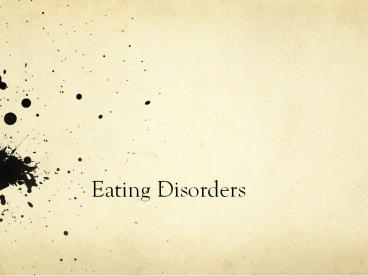Eating Disorders - PowerPoint PPT Presentation
Title:
Eating Disorders
Description:
Eating Disorders What is an eating disorder? An emotional disorder that manifests itself in an irrational craving for, or avoidance of, food. Eating disorders are ... – PowerPoint PPT presentation
Number of Views:285
Avg rating:3.0/5.0
Title: Eating Disorders
1
Eating Disorders
2
What is an eating disorder?
- An emotional disorder that manifests itself in an
irrational craving for, or avoidance of, food.
Eating disorders are often viewed as physical
illnesses because of the obvious impact on
appearance, but they effect the person mentally
and emotionally and often weigh on his/her every
thought. - Three examples of eating disorders are
- Anorexia nervosa
- Bulimia nervosa
- Binge eating
3
Why?
- The reasons that someone suffers from an eating
disorder can vary for each person. Some common
examples include - Poor body image (not happy with looks)
- Depression
- Life altering events (death in family, divorce,
etc.) - Obsession with dieting
- What is beauty? Over the course of time, society
has changed the idea of what beauty is and how
people should look
4
What is beauty?
5
Media impact
- Media images are more than meets the eye. There
are large crews of professional stylists that
change the looks of the people we see to an
unachievable status for normal people. Also, a
lot of times they use airbrushing and photoshop
to completely change the persons appearance.
Before and after of Jaime Lee Curtis at a photo
shoot. Wish I had 3 experts to help with my
make-up and hair
Click here to watch another professional
transformation
6
ED statistics
- 61 of college women show some sort of eating
pathology
- Eating disorders have
- increased threefold in the last
- 50 years
- 10 of the population is
- afflicted with an eating
- disorder
- 90 of the cases are young
- women and adolescent girls
7
Anorexia
- People suffering from anorexia have an intense
fear of weight gain and as a result, starve
themselves. - May exhibit unusual behaviors with regards to
food. - Preoccupied with thoughts of food, and may show
obsessive-compulsive tendencies related to food - may adopt ritualistic behaviors at mealtime.
- may collect recipes or prepare elaborate meals
for others.
8
Anorexia signs, syptoms consequences
- Expresses body image concerns being too fat even
though normal or thin unable to accept
compliments constantly compares self to others - Constantly talks about food
- Sudden weight loss, gain, or fluctuation in short
time - Lanugo hair (fine body hair)
9
Bulimia
- People suffer from bulimia typically overeat
(much like binge eaters) to avoid weight gain,
the person uses inappropriate weight loss
techniques such as undereating, over-exercising,
or purging. - Purging can take form as self-induced vomiting or
laxative abuse.
10
Bulimia signs, symptoms consequences
- Erosion of tooth enamel from the acid produced by
vomiting - Damage to the stomach from frequent vomiting
- Irregular heartbeat/Heart failure
- Electrolyte imbalances (loss of important
minerals like potas- sium) that can lead to
sudden death
11
Binge eating
- People who binge eat will secretly eat unusually
large servings of food in one sitting (sometimes
more than the daily recommended amount for that
person). - Almost everyone overeats on occasion, such as
having seconds or thirds of a holiday meal. But
for some people, overeating crosses the line to
binge-eating disorder and it becomes a regular
occurrence, usually done in secret.
12
Binge eating signs, symptoms consequences
- Eating unusually large amounts of food
- Eating even when you're full or not hungry
- Eating rapidly during binge episodes
- Eating until you're uncomfortably full
- Frequently dieting, possibly without weight loss
- Insomnia
- Obesity
- High blood pressure
- Type 2 diabetes
- High cholesterol
- Gallbladder disease and other digestive problems
- Heart disease
- Some types of cancer
13
How are they overcome?
- Recovery from an eating disorder almost always
requires professional help from a doctor,
psychologist or both. Remember, eating disorders
affect the mind and body. Without help, eating
disorders can lead to a persons death! - Friends and family can help support this recovery
by reminding the person that it is not his/her
fault and that they are not alone. Do not blame
the person for the eating disorder and make sure
you maintain a positive attitude when helping
someone overcome an eating disorder.































